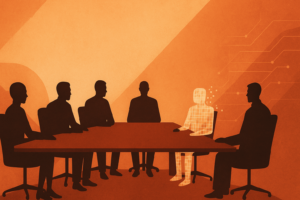Katie Hevey and Rebecca Sharkey spoke with Monique Breen, Global IT Executive Director at Boston Consulting Group (BCG), discussing her career journey and advice to women who are looking to progress to the C-suite.
Can you tell us about your pathway into your professional career?
MB: I began my technology career with a summer internship at Racal Avionics before starting university, gaining real-world experience throughout my studies. I joined a multinational technology and management consultancy as a graduate software engineer developing products for media and satellite communications clients. I progressed from there to leading engineers at PA Consulting and Sapient as well as a stint as a Product Director for a digital business banking firm.
My career gained momentum at BP in the fast-paced environment of commodity trading where I seized opportunities progressively increasing in business outcomes, budgets, teams and senior stakeholder engagement, ultimately landing my first CIO role leading the LNG, Gas and Power trading technology teams.
How did you secure your first role and what was it?
MB: I interviewed for and was accepted as a graduate software engineer at LogicaCMG through the university milk round process.
Can you tell us more about your current/most recent role?
MB: I am a Global IT Executive Director at Boston Consulting Group (BCG), a global consulting firm with 32,000 employees operating in over 50 countries. I partner with the heads of internal functions including Marketing, Legal, HR, M&A and Partner Services to drive business impact for internal teams and clients through innovative products and bold digital agendas. I am responsible for the technical advancement of staff so that they can leverage modern engineering practices and technologies like GenAI to perform operational and digital transformation activities.
I joined BCG in October 2023, previous to this, I was the VP of B2B Customer Products at BP with responsibility for defining and delivering digital products across the fleet, aviation and Castrol businesses.
If you could sum up what you need to be a successful C-suite leader in technology what would that be?
MB: A strong blend of technical acumen, strategic vision, excellent communication skills and the ability to drive innovation while effectively managing run and change activities. The role typically oversees technology across business silos; having the ability to connect the dots, presents an opportunity to streamline operations, enhance customer experiences and reduce costs.
What advice would you give other women who are looking to progress their career to a C-suite level?
MB: Be adaptable and resilient – things change so quickly in technology and companies need to pivot, so be open to change and keep learning. Demonstrate empathetic leadership by putting yourself in your stakeholder or team’s shoes. Don’t compromise on showing up as your authentic self and speak to someone you trust if you don’t feel psychologically safe at work. Having an external and internal network is important to keep pace of important trends and any politics at play. It’s a tough job, but immensely rewarding!
What would you say are the challenges women face in both becoming and being a C-suite leader?
MB: I decided to apply for my first CIO role after being motivated by my sponsors, family, and the example set by excellent role models. Lack of representation can make it harder for women to envision and pursue these roles. I also had a strong track record and wasn’t afraid to confidently demonstrate my ambition and put myself out of my comfort zone. People will make assumptions if you don’t tell them what you want out of your career. Once there, the challenges of defining the vision and strategy, navigating the macro-economic environment and stakeholders whilst balancing the need to keep abreast of technology become very real. Hiring and retaining high calibre direct reports and the wider team with diversity of thinking is critical to continued success in the role.
What communities are you a member of and what benefit do you get from being part of these communities?
MB: I am deciding which affiliation group to be involved in at BCG and am pleased that we have a vibrant Women in Tech community, I’m also happy that the energy practice have reached out to me so that I can act as an informal advisor and continue learning about the energy transition given my career history. Externally, I have signed up to POWERful Women, a professional initiative to create a gender-balanced, diverse and inclusive UK energy sector. I have enjoyed networking at events and bumping into ex-colleagues and am learning a lot about how to read into company board statistics. I have reached out to Women on Boards as I’d love to build on my NED/trustee experience. I am signing up to a great initiative TechWeCan to educate and inspire young people, especially girls to study technology subjects and choose a career in technology.
If you were going to name a leader who has inspired you, who would that be? Can you explain to us why?
MB: In the professional world, I’ve been inspired by Greg Jackson, the CEO of Octopus Energy. Our paths crossed when working at BP and I was fortunate to meet him at the Octopus office last year. He lives by his belief that renewable energy is the source of cheaper, cleaner and secure energy for customers and regularly challenges the industry and governments to be bolder. His early career of writing video games and as an entrepreneur underpins the importance he places on innovation and technology – for example Octopus’ bespoke technology platform, Kraken, now licensed to other utility companies. He is a genuine and enthusiastic leader dedicated to using technology and data to make the switch to renewable energy easier for customers.




